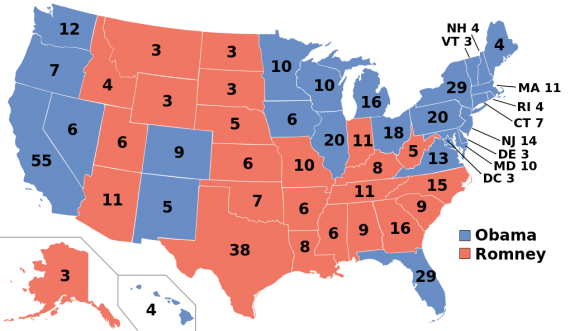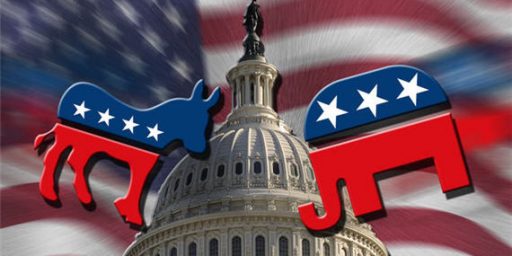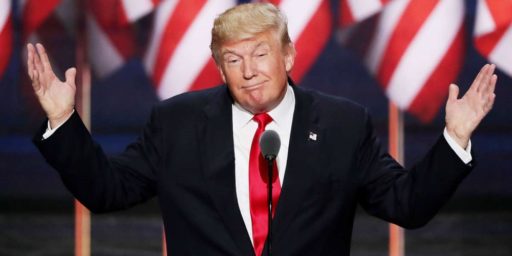A Democratic Lock On The Electoral College
The Democrats have a big advantage in the Electoral College, at least for now.
The Monkey Cage’s Ben Highton sees the Democratic Party with a big Electoral College advantage going into the 2016 election:
If the 2016 presidential vote is evenly split between the parties, which one is more likely to win the Electoral College and therefore the presidency? I estimate that the Democrats’ chances of winning the Electoral College vote are between 83 and 89 percent, giving them a significant advantage. This argument contrasts with those who are skeptical of a Democratic advantage, such as Jonathan Bernstein and Harry Enten. The reason I predict such a significant advantage is because of ongoing, long-term trends altering the electoral outlook in a number of key swing states.
To make predictions for 2016, I analyzed how the popular vote margin (the Democratic minus the Republican percentage of the vote) compared to the national vote in every state from 1992 through 2012. I examined the states individually to detect any long-term trends. For example, while Oklahoma was already significantly more Republican than the nation in 1992, it steadily became even more Republican over time.
The key to the predictions for 2016 is taking these long-term trends into account. There is also uncertainty to factor in. There is uncertainty about the trajectories of the states. And, even if states were not changing, there would be uncertainty in predicting state outcomes due to idiosyncratic factors that cannot be anticipated in advance. Both types of uncertainty can be estimated and taken into account when predicting state popular vote shares and the eventual distribution of Electoral College votes. (I follow the approach developed by Andrew Gelman and Gary King in this article.)
In short, the uncertainty is incorporated by simulating thousands of hypothetical elections where the national party division of the vote is split equally and then counting the Electoral votes across the 50 states and the District of Columbia each time. In a given simulation, if the Democrats receive more than half the Electoral votes, they are the simulated winner. If the Republicans receive more than half the Electoral votes, they are the winner.
The distribution of Electoral votes for 10,000 sets simulations is shown below. Across the simulations the Democrats receive a majority of the Electoral votes 89 percent of the time.
(…)
[T]he key to the Democratic advantage are the trends underway in some key states. While Oklahoma has moved significantly in the Republican direction, it was already strongly Republican. But, consider the 10 states whose 2012 presidential margin was within five points of the national margin. In five of them (Florida, Iowa, Minnesota, Ohio and Pennsylvania) the trends are modest in size and hard to separate from random noise. In Colorado, a more significant trend in the Democrats’ favor appears underway, but it has been uneven, which makes predictions for Colorado in 2016 more uncertain. In the remaining four states (Nevada, New Hampshire, Virginia and Wisconsin), the trends are clearer, more substantial, and all favor the Democrats.
You can read more about Highton’s methodology and conclusions at the link, but his conclusions seem to match up with what we’ve actually seen in the real world. Of the ten states with the most electoral votes, for example Democrats have won seven of them in each of the last two Presidential elections, and eight of them in at least one of the last two elections. Those seven states add up to 187 Electoral Votes, less than 90 votes short of the 270 needed to win an election. Add in the eighth state, North Carolina, and the number rises to 202. Of the next ten, Democrats have won six of those states, amounting to another 70 Electoral votes, in the last two elections and most of them in every election going back to 1992. That puts a potential Democratic nominee at just under 260 Electoral Votes, and likely hands them the election.
Republicans, on the other hand, face a far more difficult task. In order to win the Presidency in 2016, a Republican candidate would need to hold on to every state won in 2012, including states such as North Carolina where the margin of victory was fairly close, as well as winning back Ohio, Virginia, and Florida. Even then, though, the GOP would still fall short of victory at 268 Electoral Votes unless they managed to win another state that had gone for Obama in 2008 and 2012, such as Iowa, Wisconsin, Pennsylvania, or New Hampshire.
Now, it’s entirely possible that, under the right circumstances, a Republican candidate could pull off this feat. However, given the fact that the GOP has lost four out of the last six Presidential elections, and lost the popular vote in five out of six of those elections, the odds of this happening seem remote indeed, at least not as long as Republicans continue suffering from their current demographic problems. In other words, the Democrats will be heading into 2016 with a huge built in advantage, and whomever ends up getting the Republican nomination will have quite a difficult task on their hands.
Notwithstanding all of this, though, there are some caveats in order. This kind of election analysis is, for example, assumes that recent electoral history will be repeated in the future and that, for example, California will remain a Democratic state for the foreseeable future while Texas remains a Republican one, at least at the Presidential level. While there may be good reasons at the moment for believing this to be the case, the possibility always exists that something will happen that will cause a change in the political balance of the country that will then be reflected at the Electoral College level.
After the 1988 election, for example, many political pundits were writing about the supposed “Republican lock” on the Electoral College as confidently as their successors are writing about a Democratic lock today. That argument was largely based on examining the results of elections going back to 1968 that showed Republicans gaining solid hold over the South, including Florida and Texas, while holding on to California. With this kind of built in advantage, pundits argued, Republicans would likely win Presidential elections well into the next century. We all know what happened after 1988, though. Bill Clinton won in 1992 and again in 1996 by capturing several southern states and California, which has not gone for a Republican candidate since. In 2008, Barack Obama made further inroads into that Republican “lock” with wins in Florida, Virginia, and North Carolina. In 20 years, we had gone from predictions of Republican Presidents for the foreseeable future to people wondering if we’d see another Republican President in the next decade.
That history serves to remind us that the current predictions of a Democratic “lock” on the Electoral College should be taken with a grain of salt. Things can change in American politics quickly, and for reasons that we won’t see coming until they’re actually right upon us. In the short term, though, and most certainly for the 2016 election, the current trends in the Electoral College should make Republicans very worried indeed.







While your caveats are correct, we must remember that Clinton broke the electoral lock by re-positioning the Democratic Party on a number of issues. Clearly, the Republicans can also break the electoral lock today in much the same way.
The question remains: Given the current Republican base and given the discourse they have become accustomed to through Fox News and talk radio, can a candidate emerge with the flexibility to re-position the Republican Party on issues like immigration, gay marriage, contraception availability, etc., so that a new majority coalition can emerge?
I think the answer is yes, but it will not happen until after 2016 because the Republican base still believes that their views represent a majority of Americans.
I’m betting that in 2016 the “battle line” will move if anything further south. If Hillary runs, Ohio and Florida goes from toss up to lean Democratic and West Virginia and Kentucky move to tossup status.
I argue this for two reasons:
1. Medicaid expansion will benefit a lot of Appalachians (“mountain white” rural and working class voters) who will be now inclined to vote Democratic
2. Hillary is white, so that will remove a big source of cognitive dissonance for a lot of those voters who might otherwise vote Democratic.
One-party state in 3, 2, 1 . . .
@James Joyner: Beat me to it.
@James Lombardi:
100% correct in everything that you wrote.
BTW, if I was someone who made “one-party state” arguments, I think my response to you would be “a re-positioned Republican Party” would be no different than the Democrats.
Of course such an argument ignores the fact that the post-Clinton-Reposition Democrats didn’t magically become the same as the Republican party.
This is a bit simple but unil voters prove different, this is the way it is.
Bill Clinton was a popular governor who came from the south and could carry a normally red state. The optics of that alone casts the perception that this type of candidate is an individual who can “work accross the isle”. This is what most people want. This is exactly why Gov Christie was so popular and was (maybe is) perhaps the strongest candidate from the Republican side to win a presidential election. However, Clinton did not have to worry about extreme lefties driving a machine of media talking points (i.e. Fox news, Rush Limbaugh, etc.) that would’ve ultimately pulled him further to the left. Clinton did not have to worry about a fraction of the Demcratic party so extreme that it supported a government shut down.
Now, when you add to the fact that the now unpopular Gov. Christie became governor of New Jersey during a conservative wave that brought in these tea party nuts, you can argue that Governor Christie could not hold Clinton’s jock! Nevertheless, this is the type of candidate the conservatives need to tip the balance away from liberals. Unfortunately, the politcal climate today makes it very tough for such a candidate to exist.
I’d be more interested to see how your map looks if Hillary for some reason doesn’t run. I have not yet seen a scenario published that shows how Biden, Schweitzer, Warren, Cuomo would do against the likely GOP contenders.
One relatively fascinating question to me is what happens when/if the Democratic lock on the presidency is considerably stronger for the electoral college than it is the national popular vote? If it becomes apparent, through a couple of cycles, that the Republicans could win the NPV but are locked out of the electoral college due to voting totals being run up in conservative states?
Do the Democrats find a new appreciation for the electoral college? Do the Republicans start objecting to it?
One of the issues with 2000 is that even prior to it, conservatives were more supportive of the electoral college and liberals more skeptical of it. Some of this was the perception of who it benefits, but I’d argue that some of it is temperamental and philosophical. A Democratic advantage in the EC would turn this on its head.
We’re unlikely to find out, since the EC does typically so closely track with the popular vote in determining the winner (the EC has the primary effect of enhancing the margin of victory, outside of very close elections). It’s also unlikely that there were be too many more cycles of Democratic victories before the coalitions start to move around.
Even so, it’s interesting to think about.
@trumwill: Republicans would suddenly have always been opposed to the Electoral College and would continue their no doubt highly principled campaign for allocating EC votes by Congressional District rather than winner-take-all, in blue states only.
http://fivethirtyeight.blogs.nytimes.com/2013/01/25/electoral-college-changes-would-pose-danger-for-democrats/?_php=true&_type=blogs&_r=0
@JR:
It would be interesting to see if a non-Clinton Candidacy coulld reproduce that map. If they could ( or even come close), then you might see a movement for a non Clinton candidacy gain steam.
This assumes the appalachians understand they’re getting obamacare. I seem to remember a story about a guy in kentucky signing up under the state exchange and saying “Well I hope at least this’ll be better than Obamacare”
I am skeptical of talks of an “electoral lock” for another reason: an electoral college advantage hardly matters unless there is a serious chance that the winner of the popular vote will lose the electoral vote. I continue to believe that this situation is extremely unlikely. It happened in 2000 (sort of), but that doesn’t change the fact that it was an improbable event. It’s only happened two other times in American history, and at least one of those times–1876–was as questionable as 2000. The electoral college has a big impact on the way candidates campaign in every election, but in terms of who wins, it’s a safe bet that the party with the most support in the popular vote has the greatest chances of victory.
@steve s:
It’s true I’m assuming even halfway decent Democrat messaging on the ACA (a gigantic assumption, I admit).
Still, there are a couple of decent pro-ACA ads out there. See here and here. SenatorsPryor and Landreiu plan to run agressively on Medicaid expansion, and both are leading.
If anything, this continues to show that we focus unduly on the Presidential election while neglecting how much damage can be done with dysfunctional Congressional elections.
We’re seeing the limits of presidential power without a cooperative Congress.
@Tillman:We’re also neglecting how much damage ALEC and their allies can do at the state level. Also the non-elective damage to the polity that can be done, e.g. Cliven Bundy and his supporters.
@LaMont:
There is not a Republican who is involved in politics today who has the skill set to lead the Republicans to being relevant again. Look at how pathetic the supposed moderates such as Jeb Bush and Jon Huntsman are when they appear in public. They are incapable of explaining to the public their vision for the U.S. and definitely do not have the leadership skills to lead others. Their may leadership style is to insult current Republican voters and pander to the most liberal groups in the U.S.
Instead of thinking about the impact of the electoral lock on presidential elections, the real question is what happens to policy and governance when the Democrats do not risk losing in the general election. In the future, historians will probably conclude that David Axelrod and his group found a way where all paths lead to victory for the Democrats. If current trends continue, actual performance will probably have no effect in the general election since well more than 50% of the voters will be automatic Democratic Party voters.
@JR:
If you want to see all of the Democrats who should easily win the general election just write down a list of all currently serving Democrat Senators and Governors and then scratch off those who did not attend an Ivy League University. Everyone one left should be able to beat every Republican who is currently being mentioned as president. The idea that any Republican can win in 2016 against any live body Democrat is laughable. That is how good the lock is for the Democrats.
Of course this is the elephant piñata in the room…California changed radically because Republicans in that state showed a strong animus against Hispanics and the GOP paid a huge price…the same thing could eventually happen in other states with large Hispanic populations as many in today’s GOP make those old California Republicans look like teddy bears by comparison on this issue…how can the GOP ever succeed at presidential elections while so many in that party show open hostility towards Hispanics…
@steve s: The incident you’re referring to involved a man at a Kentucky State Fair who expressed interest in Kentucky’s exchange, Kynect, by saying, “This beats Obamacare I hope.” The article didn’t say whether he ended up enrolling in it or not.
Another anecdote I found interesting involved a Kentucky woman who was ecstatic about her new Medicaid coverage. Unlike the man at the fair, she realized it was a result of Obamacare–but she still hated Obama anyway. As she put it, “If I had to think of one thing good about him, it’s the insurance.”
It reminds me of Republicans I’ve known who are on food stamps, but who routinely bash other beneficiaries of the program. They always think that they’re the exception, that they deserve the benefits unlike the lazy moochers who make up the majority of the recipients.
A few months ago I went to Kynect’s website and noticed that it made no mention of Obama, Obamacare, or the Affordable Care Act, and the FAQ actually made it sound as if the governor, Steve Beshear, unilaterally set up the exchanges on his own, without prompting from any federal law.
The political scientist Jonathan Bernstein (whose blog I highly recommend) has argued that the law will continue to be unpopular even while the benefits become politically untouchable, because most people won’t even realize the benefits come from Obamacare–especially those benefits that are easy to overlook after they become the status quo (the subsidies, the preexisting conditions ban, the Medicaid expansion, and so on). I’m not as convinced the law won’t increase in popularity or that there won’t be more than a few conservatives who become the proverbial “conservative who gets mugged.” I’m paying particular attention to the development of the law in Kentucky, for that reason. But I do agree with Bernstein that I’d like to see more data on how many Obamacare beneficiaries realize where their benefits come from, and I definitely think some of them don’t know, or dismiss it with the help of some cognitive dissonance.
@An Interested Party:
Those same idiot Republicans in California were the biggest supporters of amnesty in 1986. Those idiot Republicans forgot to calculate the costs and the political impacts of that amnesty. Now California is a one party that there is no chance that the Republicans will be relevant in the state again. The only question for California is what happens when all the groups inside the Democratic Party no longer have the threat of Republicans to keep them united. Several commentators have noted that the Democrats in California are currently fighting over whether to bring back affirmative action with Latinos supporting the move and Asians fighting against it.
@superdestroyer:
Demographics is not destiny.
The Republicans had no reason to worry about Hispanic voters in 1986; Reagan won 45% of them in 1980. H.W. Bush won nearly 40% of Hispanic voters in 1988.
Then came prop 187, a measure that supporters said was aimed at illegal immigrants but which was promoted with overtly racist messages. That galvanized the Hispanic population and led dramatic increases in voter registration among that group. The support for 187 from Republicans, especially Governor Pete Wilson, tied the GOP to the measure in the minds of these newly motivated Hispanic voters, made them Democrats, and doomed the GOP in California.
tl;dr – If you want someone to vote for you, don’t attack them.
@Kari Q:
Those percentages are specifically for Latino voters in California, not national results.
I’ve seen some state polls from Colorado which put some Republicans running even to Hillary there, but have her with some healthy leads in North Carolina. With the political re-alignment of some Western states such as California, Oregon and Washington turning Democratic some years ago, along with the traditional Democratic strengths in the big industrial states and New York, Texas and maybe Florida are the only big states still in the Republican column, making their White House math more difficult. Even John Kerry, who lot the White House by a couple of points to Bush, could have won the White House if he could have won Ohio, because of the new electoral math now favoring the Democrats.
@LaMont:
Arkansas wasn’t a normally red state at the time. It was solid Democratic for about a hundred years through the 1964 election, voted for Nixon in ’68 and ’72, went for Carter in ’76, Reagan in ’80 and ’84, Bush in ’88, and Clinton in ’92 and ’96. Basically, went from solid blue state to swing state to solid red state over a period of about 40 years.
To be sincere, no healthcare plan in the world would ever survive if it was named after a politician. If Britain´s NHS was named Attleecare or something like that it would also be unpopular.
@Kari Q:
Reagan did not get 45% of the Latino vote in 1980. He received the standard 1/3 that Repubicans have usually received. See http://www.pewhispanic.org/files/2012/11/2012_Latino_vote_exit_poll_analysis_final_11-07-12.pdf page 4.
Reagan was stupid he he repeated the line that Latinos are Republicans but do not know it. In reality, Latinos are natural liberals and do know it. Any Republicnas who thought that it could win a majority of a demographic group where 1/3 drop out of high school and more than 50% of children are born to unwed mothers is an idiot.
The Republicans passed amnesty in 1986 and the percentage of the Latino vote received by Republicans went down. The California Republicans seemed impossible of understanding demographics.
@Kylopod: I think that the dynamic you describe means there is no chance that an ACA beneficiary like the two people in the state fair will ever vote for Obama, or really any national democrat outside, maybe, the Clintons, because they perceive them as strangers. However, the dynamic in a state race, where the democratic candidates start off with reasurring locals their share their culture , and then run for the local iterations of the ACA: “Candidate A wants to make Kynect better/make sure coal miners have access to lung doctors/ making sure Medicaid is expanded so that YOU have access to healthcare just like them others” could probably make enough of a bent in the poor white vote to make himself/herself competitive. Remember, the Kentucky governor made himself national spokesman for Obamacare, and has approval rating in the high 50s…
@superdestroyer: So, a “one party state”, i.e a coalition so wide that it contains groups with widely disparate interests, creates cleavages within the ruling party that the opposition party can use if it plays for the dissaffected parts of the ruling coalition, and ditches the parts of its platform that the are a deal-breaker for those groups? Who could have thought that was possible. After all, after the 1936 election, when the GOP was shattered, and FDR hooked the entire population on Social Security and unemployment insurance and FDIC and mortgage aid, the Democrats ruled the land for the nex 80 years, untipterrutedly! Even a war hero like Eisenhower, running on a platform of making peace with some elements of the New Deal (social security, housing programs) and promising to weaken others (the power of the unions) could not break that lock, and spent the 1950s on his farm, bitter and broken man.
@An Interested Party: You’re correct about the (former) GOP lock on the Electoral College. Wonder how the picture might change if enough Hispanics register and vote to tip Texas back to purple, if not blue?
@Rafer Janders:
Carter did serve as governor of Georgia in 1971. He still had political clout in the south during that time, evident by the fact that he won most of the southern sttes in 1976 – so I can understand that.
The Democratic party for years before the 60s is not the same party of today. There were those “southern democrats” that turned into the extreme righties today. So I would discount Arkansaw going democratic in the years before 1964 – its apples and oranges. Carter came on the hills of that transition and probably benefited before the south fully transitioned to the extreme right. Clinton legitimately won enough states in the south because he was popular enough to win against a president that was not popular among his own party at the time. Again, my bigger point, today’s politcal climate would not afford such a candidate.
@superdestroyer:
As I said, those percentages were strictly for California Latino voters. “Ronald Reagan raised his share of the Latino vote from 35 percent to 45 percent in 1984 while carrying 59 percent of the entire state.”
“the Latino vote became 10 to 13 percent more Democratic following the anti-immigrant policies endorsed by the GOP in 1994. In 1992 Democrats won 65 percent of the Latino vote, in 1996 Democrats won 75 percent of the Latino vote and by 2012 they were winning 78 percent of the Latino vote.”
Republicans destroyed their own chances with Latino voters by pursuing policies that were at least covertly (and sometimes no covertly) anti-Latino. So step number one to getting minorities to vote for the GOP would be to stop attacking them.
Hmm, I guess all those measures being trotted out by state Republicans to make it harder for minorities to vote won’t help with step number one…